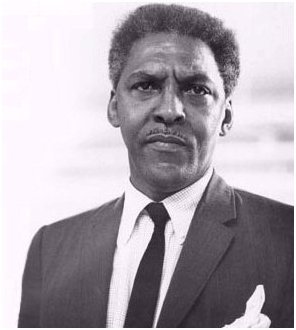

__________________________
History is Queer: Bayard Rustin
History is Queer is a series of entries highlighting LGBTQ individuals in the contemporary world and throughout history.

Who: Bayard Rustin
When: 1912-1987
Where: United States of America
Why you should care:Bayard Rustin was an activist, speaker, and organizer for civil rights, gay rights, labor rights, and socialism. He also practiced and advocated nonviolent resistance and pacifism.
Rustin was born in 1912 in Pennsylvania. He was raised by his mother’s parents. His grandmother was a Quaker and an early member of the NAACP, so Rustin was exposed to not only civil rights ideas early in life, but civil rights leaders; W.E.B. DuBois was a frequent guest in the household.
Rustin attended a number of colleges, becoming active in civil rights causes as well as communist and Quaker organizations. He was also an accomplished vocalist; his smooth tenor made him a requested performer at venues, which exposed him to more friends and colleagues.
With the onset of World War II, Rustin became disillusioned with his communist organizations and instead joined socialist causes, including the pacifist Fellowship Of Reconciliation. As a member of FOR, Rustin met with President Franklin Delano Roosevelt, along with FOR leader A.J. Muste and A.P. Randolph, to protest racial discrimination in the US armed forces. When the three told Roosevelt that a civil rights protest march would happen unless he took action, FDR issued the Fair Employment Act. This banned discrimination in defense industries and federal agencies.
In 1942, Rustin got on a bus in Kentucky bound for Tennessee. He sat in the second row and refused to move to the back. Eventually, the bus stopped and police dragged him out and beat him. He was held in a cell and beaten some more, but released uncharged. However, his pacifist leanings and frequent protests made him a target in other ways, and he was imprisoned for violating the Selective Service Act. He served time from 1944-1946, two years after his bus protest and having helped found the Congress On Racial Equality (CORE).
In 1947, Rustin and a group of other CORE members rode on buses throughout the South, testing the desegregation order that came about, in part, as a result of Rustin’s earlier protest. This group rode buses in pairs of one African-American man and one white man. Rustin and other members were arrested over and over during this act, called the Journey of Reconciliation. The NAACP rejected this move for being too meek, though it adhered to the tactics Rustin learned from Mahatma Gandhi.
Rustin traveled to India in 1948 to learn further nonviolent tactics, but didn’t arrive until after Gandhi had been killed. Four four years, Rustin met with Gandhi supporters, including leaders in Nigeria’s and Ghana’s liberation movements. Back in the US in 1953, Rustin was arrested in California for having homosexual sex. Because it was consensual, he plead guilty to a charge of “sex perversion”, for which he was kicked out of FOR and served sixty days in jail.
In 1956, Rustin began his association with Dr. Martin Luther King, Jr. Thanks to Rustin, King began to reject guns and instead focused on nonviolent tactics that would be used in the Montgomery Bus Boycott. Prior to Rustin’s involvement, King had used armed guards and a personal handgun for protection. Rustin and King also worked in the Southern Christian Leadership Council until Rustin’s public homosexuality and former Communist association forced his resignation.
Rustin’s old friend A.P. Randolph promoted him when it came time to organize August 1963’s March on Washington for Jobs and Freedom despite being publicly blasted by Senator Strom Thurmond. Despite objections from the NAACP, Rustin received wide recognition for organizing the march. He also organized a school boycott in New York City and spoke at the University of Virginia.
After 1965 and the Voting Rights Act, Rustin advocated working-class African Americans becoming more closely affiliated with the Democratic Party. He foresaw the increasing automation of low-skill jobs as being disastrous for low-income and working class African Americans, and rejected the growing black nationalism movement, personified by the Black Panthers. Instead, he began to work closely with the AFL-CIO and advocated integration of labor unions, which had been largely white.
In the 1970s, Rustin became a co-chairman of Social Democrats USA and supported President Johnson’s policy of containment, including the Vietnam War. Rustin disagreed strongly with the actual conduction of the war, however. As a member of the board of trustees for the University of Notre Dame, Rustin became worried about the treatment of Jews in the Soviet Union, coming to eventually favor moving them to Israel.
In the 1980s, Rustin began to openly advocate for gay rights. He had always been open about his sexuality, but had not done much advocacy work. His last notable speech was entitled “The New Niggers are Gays”. Rustin died in 1987 from a perforated appendix. His partner of ten years, Walter Naegle, was present at the funeral. Many social justice centers and groups share his name despite the fact that he has not received as much recognition as other civil rights leaders.
REFERENCES:
